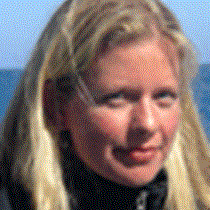Drake Passage, Northbound
The Drake Passage treated us reasonably well today, and we awoke to only slightly lumpy seas and swell. The rocking and rolling caused us to occasionally lurch around and stumble a bit as we walked through the ship, but for the most part it was a pleasant day and a pleasant ride. The sun shone all day and sparkled brilliantly across the waves and the blue, blue sea. Since the wind was quite gentle, not so much birdlife was to be seen, but from time to time small pockets of life appeared and little flocks of dainty prions flitted over the waves. Beautiful black-browed albatrosses also flew past the ship now and then, their elegant bodies and black-streaked eyes watched us from high above as they contemplated our ship and the small red dots that wandered around on the open decks. As parka-clad human and albatross contemplated each other the question arose—who was watching who? Certainly it was the albatross in its relaxed position with outstretched wings that was in its native and familiar habitat whereas we depended completely on the ship and its contents for our continued survival. The Drake Passage—that famous body of water we were now crossing for the second time has the circumpolar current that races through it at a rate that carries 600 times the water volume of the Amazon River. And it is cold water and not a place for a casual swim. We were thankful for the steady and stable ship we were on and glad of the technology that made crossing this passage with relative ease possible. A small sailing yacht with sails stretched to catch the wind was seen in the morning heading south through the swell and we could only contemplate what it must be like onboard such a small vessel in these relatively calm seas and admire them for their courage.
It was a day for catching up on diaries and photo editing and a chance to look back and contemplate the wonderful sights and sounds and smells (!) we had experienced over the past several days. Boots were scrubbed and packed away, though perhaps the eau-de-guano should be carried home so that while showing friend and family photos of the voyage, the experience for them could be more complete?
A series of lectures kept everyone busy during the course of the day. Peter Hillary gave a talk about his father Ed and the wonderful life he had led and the wonderful inspiration and man that he had been. Rodolfo talked about the krill fishery and its management as well as threats to the Antarctic ecosystem from climate change and sea ice reduction that all linked together. David Doubilet and Jennifer Hayes took us on a wonderful photographic journey across the world’s many oceans. And in the evening we gathered as always once again in the lounge for our last recap of the voyage.




